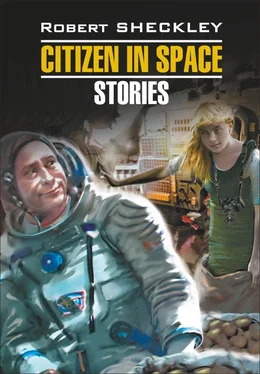It took Eldridge a moment to digest this.
“Do you mean – you are from the future?” he blurted.
One of the policemen nudged the other. “What an act!” he said admiringly.
“Better than a groogly show,” the other agreed, clicking his handcuffs.
“Of course we’re from the future,” Viglin said. “Where else would we be from? In 1962, you did – or will – invent the Eldridge Time Traveler, thus making time travel possible. With it, you journeyed into the first sector of the future, where you were received with highest honors. Then you traveled through the three sectors of Civilized Time, lecturing. You were a hero, Eldridge, an ideal. Little children wanted to grow up to be like you.”
With a husky voice, Viglin continued. “We were deceived. Suddenly and deliberately, you stole a quantity of valuable goods. It was shocking! We had never suspected you of criminal tendencies. When we tried to arrest you, you vanished.”
Viglin paused and rubbed his forehead wearily. “I was your friend, Tom, the first person you met in Sector One. We drank many a bowl of flox together. I arranged your lecture tour. And you robbed me.”
His face hardened. “Take him, officers.”
As the policemen moved forward, Eldridge had a good look at the black machine they shared. Like Viglin’s, it had several dials and a row of push buttons. Stamped in white across the top were the words: Eldridge Time Traveler – property of THE EASKILL POLICE DEPT.
The policeman stopped and turned to Viglin. “You got the extradition papers?”
Viglin searched his pockets. “Don’t seem to have them on me. But you know he’s a thief!”
“Everybody knows that,” the policeman said. “But we got no jurisdiction in a pre-contact sector without extradition papers.”
“Wait here,” Viglin said. “I’ll get them.” He examined his wristwatch carefully, muttered something about a half-hour gap, and pressed a button on the Traveler. Immediately, he was gone.
The two policemen sat down on Eldridge’s couch and proceeded to ogle the Gauguins.
Eldridge tried to think, to plan, to anticipate. Impossible. He could not believe it. He refused to believe it. No one could make him believe —
“Imagine a famous guy like this being a crook,” one of the policemen said.
“All geniuses are crazy,” the other philosophized. “Remember the stuggie dancer who killed the girl? He was a genius, the readies said.”
“Yeah.” The first policeman lighted a cigar and tossed the burned match on Eldridge’s shaggy little red rug.
All right, Eldridge decided, it was true. Under the circumstances, he had to believe. Nor was it so absurd. He had always suspected that he might be a genius.
But what had happened?
In 1962, he would invent a time machine.
Logical enough, since he was a genius.
And he would travel through the three sectors of Civilized Time.
Well, certainly, assuming he had a time machine. If there were three sectors, he would explore them.
He might even explore the uncivilized sectors.
And then, without warning, he became a thief.
No! He could accept everything else, but that was completely out of character. Eldridge was an intensely honest young man, quite above even petty dishonesties. As a student, he had never cheated at exams. As a man, he always paid his true and proper income tax, down to the last penny.
And it went deeper than that. Eldridge had no power drive, no urge for possessions. His desire had always been to settle in some warm, drowsy country, content with his books and music, sunshine, congenial neighbors, the love of a good woman.
So he was accused of theft. Even if he were guilty, what conceivable motive could have prompted the action?
What had happened to him in the future?
“You going to the scrug rally?” one of the cops asked the other.
“Why not? It comes on Malm Sunday, doesn’t it?” They didn’t pare. When Viglin returned, they would handcuff him and drag him to Sector One of the future. He would be sentenced and thrown into a cell.
All for a crime he was going to commit.
He made a swift decision and acted on it quickly.
“I feel faint,” he said, and began to topple out of his chair.
“Look out – he may have a gun!” one of the policemen yelped.
They rushed over to him, leaving their time machine on the couch.
Eldridge scuttled around the other side of the desk and pounced on the machine. Even in his haste, he realized that Sector One would be an unhealthy place for him. So, as the policemen sprinted across the room, he pushed the button marked Sector Two.
Instantly, he was plunged into darkness.
When he opened his eyes, Eldridge found that he was standing ankle-deep in a pool of dirty water. He was in a field, twenty feet from a road. The air was warm and moist. The Time Traveler was clasped tightly under his arm.
He was in Sector Two of the future and it didn’t thrill him a bit.
He walked to the road. On either side of it were terraced fields, filled with the green stalks of rice plants.
Rice? In New York State? Eldridge remembered that in his own time sector, a climatic shift had been detected. It was predicted that someday the temperate zones would be hot, perhaps tropical. This future seemed to prove the theory. He was perspiring already. The ground was damp, as though from a recent rain, and the sky was an intense, unclouded blue. But where were the farmers? Squinting at the sun directly overhead, he had the answer. At siesta, of course.
Looking down the road, he could see buildings half a mile away. He scraped mud from his shoes and started walking. But what would he do when he reached the buildings? How could he discover what had happened to him in Sector One? He couldn’t walk up to someone and say, “Excuse me, sir. I’m from 1954, a year you may have heard about. It seems that in some way or —”
No, that would never do.
He would think of something. Eldridge continued walking, while the sun beat down fiercely upon him. He shifted the Traveler to his other arm, then looked at it closely. Since he was going to invent it – no, already had – he’d better find out how it worked.
On its face were buttons for the first three sectors of Civilized Time. There was a special dial for journeying past Sector Three, into the Uncivilized Sectors. In one corner was a metal plate, which read:
Caution: Allow at least one half-hour between time jumps, to avoid cancelation.
That didn’t tell him much. According to Viglin, it had taken Eldridge eight years – from 1954 to 1962 – to invent the Traveler. He would need more than a few minutes to understand it.
Eldridge reached the buildings and found that he was in a good-sized town. A few people were on the streets, walking slowly under the tropical sun. They were dressed entirely in white. He was pleased to see that styles in Section Two were so conservative that his suit could pass for a rustic version of their dress.
He passed a large adobe building. The sign in front read:
PUBLIC READERY.
A library. Eldridge stopped. Within would undoubtedly be the records of the past few hundred years. There would be an account of his crime – if any – and the circumstances under which he had committed it.
But would he be safe? Were there any circulars out for his arrest? Was there an extradition between Sectors One and Two?
He would have to chance it. Eldridge entered, walked quickly past the thin, gray-faced librarian, and into the stacks.
There was a large section on time, but the most thorough one-volume treatment was a book called Origins of Time Travel by Ricardo Alfredex. The first part told how the young genius Eldridge had, one fateful day in 1954, received the germ of the idea from the controversial Holstead equations. The formula was really absurdly simple – Alfredex quoted the main propositions – but no one ever had realized it before. Eldridge’s genius lay chiefly in perceiving the obvious.
Читать дальше












